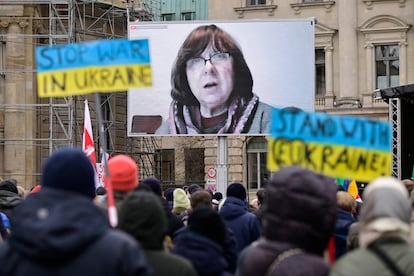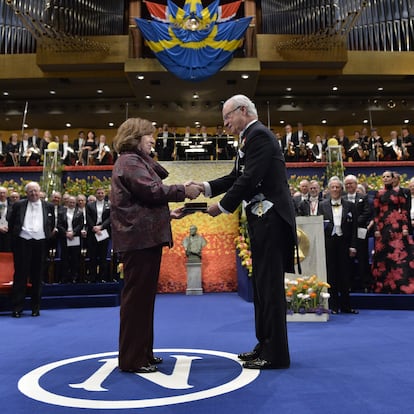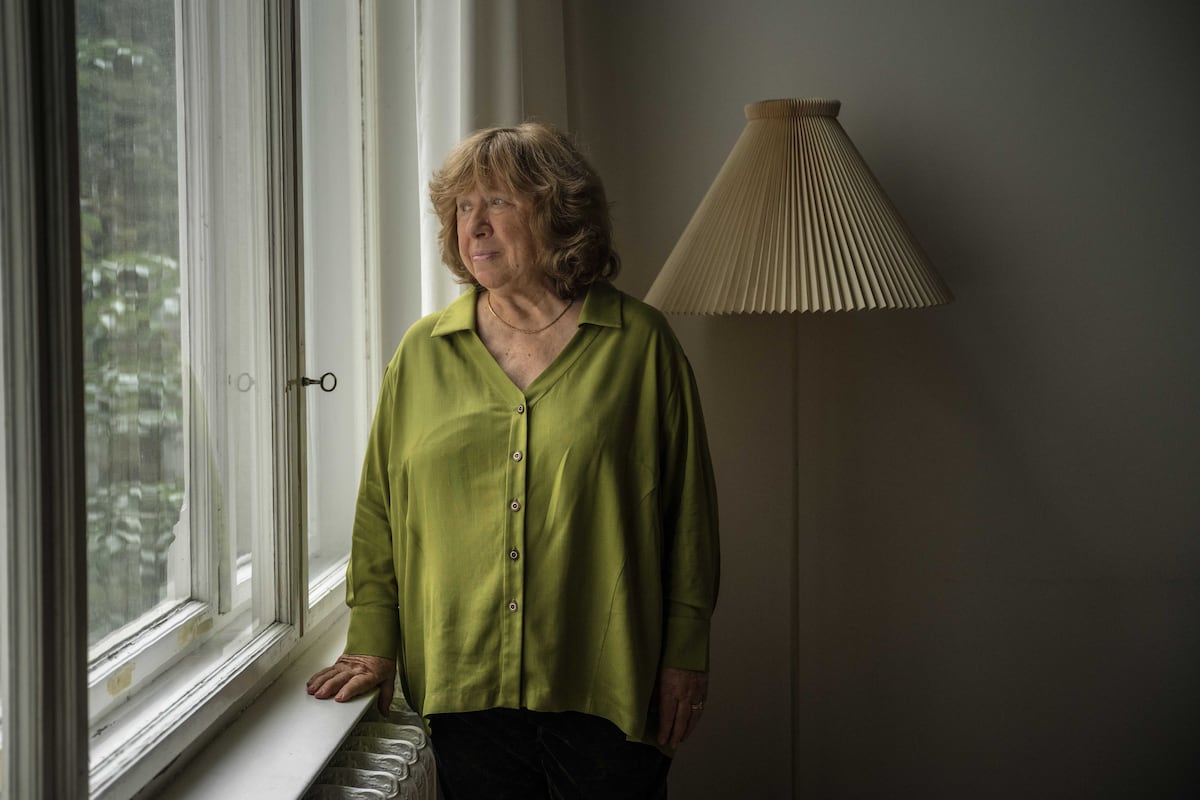Svetlana Alexievich, the Belarusian author who writes in Russian and won the Nobel Prize in Literature in 2015, lives in the same Berlin apartment, with its high ceilings and spacious rooms, where EL PAÍS visited her four years ago. The author of Voices from Chernobyl, Zinky Boys: Soviet Voices from the Afghanistan War, and Secondhand Time: The Last of the Soviets continues to write by hand. On a long table lie fragments of the manuscript for her new book, which is no longer the one she was outlining in 2021, as events interfered with the work of the exiled author: in February 2022, Vladimir Putin, afflicted by imperial nostalgia, launched a war in Ukraine, and less than two years later, Donald Trump shattered the illusion of global solidarity.
A member of the Coordinating Council of the Opposition to dictator Alexandr Lukashenko during the 2020 protests in Belarus, the writer observes a widespread backsliding of democracy, which goes far beyond the Soviet legacy.
Alexievich gathers testimonies from the millions of Belarusians, Russians, and Ukrainians who have taken refuge in Europe, as well as from institutions that document repression and war in the Slavic territories that once belonged to the Soviet Union. She also explores other avenues in search of revealing insights. Alexievich is particularly interested in the possibility of coexistence between victims and perpetrators, and among her current reading is a book on dictatorships in Spain, Greece, and Italy, The End of the Regime: How Three European Dictatorships Ended, by Alexander Baunov, published in Russian in 2023.
Question. Let’s talk about the book you’re writing…
Answer. It’s not finished yet. I had almost completed it when the war came and… [with a slight wave of her hand and a hint of a whistle, Alexievich indicates that the project evaporated]. It became clear that another approach was necessary, and it’s difficult, because the war literally left us speechless, because words lost their meaning, because we didn’t have the necessary terms, and only now are we beginning to recover. In The Last of the Soviets, I wrote about how that empire was collapsing, but now a general process is taking place. Deep Russia and Deep America have risen up, and democracy is receding all over the world.
Q. In the fall of 2021, you wrote about the Belarusian opposition being harshly repressed by Lukashenko.
A. Now my book is broader. In the 1990s, when I was working on Secondhand Time, the subtitle [in Russian] was “The End of the Red Man” [translated into Spanish as The End of Homo Sovieticus]. I buried him too soon, because Homo Sovieticus hasn’t died; he’s in the Kremlin, and fighting and shooting in Ukraine. Some things from the first version are still valid, but there’s a lot to rethink and redo…
Q. Could it be said that, if The End of Homo Sovieticus was a chamber composition with some allegro ma non troppo fragments, we are now faced with a composition for symphony orchestra with a more tragic rhythm?
A. I never limited myself to the Belarusian experience, but now this is broader… I’ve read and seen much of what has been written and filmed about what Lukashenko is doing and about the prisons. These authors are hostages to suffering, and those books have fallen out of favor, even though the prisons remain full. People need new answers. In the first two years [of the war], Ukrainians hoped that America would help them win, and we hoped that Lukashenko would fall so we could return to our country and do what we couldn’t do in the 20th century. But it didn’t happen that way. Now, Ukrainians and Belarusians are desperate.
I feel a lot of hatred toward Lukashenko and his associates but I believe everything must be done according to the law and that they must be tried in the Hague tribunal
Q. Are your characters Belarusian, Russian, or Ukrainian?
A. I’m referring to all those who were swept off the ship by a great wave and who now have to rethink that experience. They are all castaways, but perhaps the Ukrainians have been freed somewhat more than the Belarusians and Russians. Belarus is now an occupied country, where there are Russian troops, aircraft, and military camps, where there are Russian military hospitals and service workshops for their tanks — a country from which the Russians can reach Ukraine at any moment with fresh forces. Considering all this, we are complicit in the aggression, but in an occupied country, you can’t demand that people take to the streets because they can be sentenced to 15 years in prison for carrying the Belarusian flag [the former national flag, banned by Lukashenko].
Q. Your works are choral, based on real testimonies. Have you spoken to many people for your new book?
A. Yes. This year I’ve worked in Prague, Vilnius, and Warsaw, as well as Berlin. In Europe, there are millions of exiles: Belarusians, Ukrainians, and “good Russians.” I’ve occasionally spoken with “bad Russians,” like one who, before joining the front in Ukraine, came from Siberia to say goodbye to his sister, who lives in Germany. He was a man of about 52, in good shape, and he explained that his family, reunited, had decided that the only way to finish paying off the mortgage and overcome their financial difficulties was to send him to war. And when I asked him if he had enlisted just for the money, he said he hated the khokhly [a vulgar way of referring to Ukrainians in Russian]. “I hate them, and that’s all,” he told me without further explanation. He considered the Russian soldiers in Ukraine to be heroes, as were the Soviet soldiers in Afghanistan, and accused me of slandering the latter in Zinky Boys.
Q. Among the material for the book are also testimonies recorded by a Ukrainian journalist, whom the Ukrainian authorities allow to lend his cell phone to Russian prisoners so that they can talk to their families in Russia.
A. Yes, I have heard, for example, a conversation between a prisoner and his wife, who tells him that an acquaintance, also a fighter in Ukraine, has sent his daughter a computer and sneakers and reminds him that his own daughter is about to start the school year and needs a tablet.
I have other testimonies. A journalist who traveled to Buryatia [a Siberian territory over 3,700 miles from Ukraine] spoke with a mother there who had just buried her son [who was killed on the Ukrainian front]. The mother began to speak, but then became frightened and refused to continue, claiming that if the journalist wrote it down, she wouldn’t receive the compensation for her son’s death, which she planned to use to buy her daughter an apartment. So she stated only that her son had fallen a hero and that, if it hadn’t been for him, the Ukrainians would have already reached Buryatia. That’s what television does!
Someone told me that a lot of money is circulating in Russia, war money with which Putin has bought the country and enslaved its inhabitants, especially those in the periphery, who live in abject poverty. And these poor people then boast about buying fur coats and rings for their wives.
Q. More informed Russians with a higher standard of living are also fighting.
A. Yes, and they live by the motto: “Keep quiet, or you won’t get the money.” They’re either complicit or they’ve sold out. In Belarus, on the other hand, Lukashenko didn’t buy off the population; he frightened them instead.
 Svetlana Alexievich addresses anti-war protesters via video link at a rally organized by the international literature festival “For Your and Our Freedom! Voices on the War in Ukraine,” in Berlin, March 6, 2022.JOHN MACDOUGALL (AFP / GETTY IMAGES)
Svetlana Alexievich addresses anti-war protesters via video link at a rally organized by the international literature festival “For Your and Our Freedom! Voices on the War in Ukraine,” in Berlin, March 6, 2022.JOHN MACDOUGALL (AFP / GETTY IMAGES)
Q. When will your book be finished and what is its structure?
A. I think by the end of next year. I don’t want to reveal its structure, but it has three chapters: Time of Revolution, Time of Defeat, and Eternal Time. Many things have converged on us; on the one hand, artificial intelligence, with which we all interact to varying degrees, and on the other, the columns of tanks on the border with Ukraine. Several eras coexist in our time. People often tell me they talk to artificial intelligence because they have no one else to talk to. Damn it.
Q. Was communism a dying idea when you wrote The Last of the Soviets?
A. It was an idea that was dying, but it didn’t die, and imperial ideas also collapsed. [The conceptual artist] Ilya Kabakov wrote that, when we were finally satisfied with having defeated communism, suddenly, looking around, we saw that everything was full of rats. We don’t know how to fight rats, and literature can’t tell us either. That grotesque monster fragmented into a pile of rats. From it emerged other monsters that had been compressed there, and it turned out that, for money, human beings can go and kill their own Ukrainian brothers. People who knew the Era of Stagnation under Leonid Brezhnev [the Soviet leader from 1964 to 1982] tell me that the present times are more terrifying than then, when people were also imprisoned, but less so than during the Gulag era, of which there are hardly any survivors.
Q. In Soviet times there were people with ideals. Your father was a soldier and didn’t fight for money.
A. My father was a communist, a bright Belarusian boy who left his village to study at the military journalism institute in Minsk. As a student, he went off to war because his country was in danger. Afterward, he was offered a promotion within the party, but only if he divorced my mother. She was Ukrainian and had lived in German-occupied territories, which was a disadvantage for his career. My father loved my mother and refused to leave her, so he was sent to head a provincial school. He believed the communist ideal was good, but that Stalin had corrupted it. When I returned from Afghanistan and told him that his former students were acting like drunks and murderers there, he burst into tears. Then I understood — ah! [pauses] — that love was paramount. There was even a time when he and my mother, angry with me, wanted to disown me as if I were an enemy of the people, but they didn’t, because we loved each other. Before he died, he asked us to put his party membership card in the coffin. He believed until the very end.
 Alexievich receives the Nobel Prize in Literature from King Carl XVI Gustaf of Sweden in Stockholm on December 10, 2015.JONAS EKSTROMER (AFP / GETTY IMAGES)
Alexievich receives the Nobel Prize in Literature from King Carl XVI Gustaf of Sweden in Stockholm on December 10, 2015.JONAS EKSTROMER (AFP / GETTY IMAGES)
Q. Are Belarusian political prisoners included in your book?
A. I tell stories about them. For example, about the mother of a talented computer programmer sentenced to many years in prison for opposing Lukashenko. She had her son’s portrait drawn on a board, put wheels on it, and took it with her everywhere.
Q. What is the West doing for political prisoners?
A. The West did a lot for them, but only through diplomacy. In contrast, Trump has started buying them off, and as far as I know, Lukashenko seized on this. “The money upfront.” And in return, he received parts for Belarusian planes that were no longer flying. There are nearly 2,000 prisoners in jail, and Lukashenko refuses to release them all at once. He prefers to do it in batches so he can get something for each one. Even worse, he imprisons new people — more people than he releases — such as those who help political prisoners or their families.
I am against the rejection of the Russian language in Ukraine, but I think it’s a temporary phenomenon born of desperation, not a permanent trend
Q. I imagine he’ll ask for a good price for Maria Kolesnikova [one of the leaders of the 2020 protests, sentenced to 11 years].
A. Someone who has been freed from prison has said that those who select prisoners for release have started feeding her better so she looks in better health. They suspect that perhaps they are preparing her for release.
Q. I was impressed by Nikolai Statkevich, the social democratic politician, who refused to leave Belarus after being released…
A. I’m not a supporter of our culture of heroism. Sign whatever it takes to get a pardon and go back to your family! Life is more important than anything else, and the most important thing is getting out of prison.
Q. In 2020 you were a pacifist, and now?
A. I was and I still am. If the Coordination Council had urged people to take up arms, I don’t think so many people would have taken to the streets. When the first revolution and its clashes occurred in Belarus [in 2010], some relatives from my village asked me to visit an acquaintance of theirs, a young man who was a member of the special intervention forces, OMON, who had been beaten and was in the hospital. I went to see him, and his bedmate was one of the young people who had protested. Seeing their mothers crying, I understood that I couldn’t incite bloodshed.
Q. I understand, but there are situations…
A. Yes, there are hopeless situations, like those described in the latest report by U.N. Special Rapporteur Mariana Katzarova on the treatment of prisoners in Russian jails. Horrific things, like sawing off their teeth, or torturing a Ukrainian journalist and handing her over to her parents without her internal organs.
Q. Does exile unite or divide?
A. If we talk about Belarus, where the dominant theme is the experience of 2020, those who left accuse those who stayed of complicity with the regime and of apathy, and those who stayed say they are doing well and that it’s as if we never existed, because we left no trace. I will return to Belarus when everyone else returns. I won’t return alone.
Q. Can Belarusian culture be developed in Russian, just as Irish culture is also expressed in English?
A. I am a Belarusian writer and I write in Russian.
Q. What do you think of Ukraine’s rejection of the Russian language and works written in Russian?
A. I’m against it, but I think it’s a temporary phenomenon born of desperation, not a permanent trend. After all, the languages left behind by the colonizers in Africa were a path to civilization. And that’s a good thing.
Q. Do you feel hatred for Lukashenko and his associates?
A. A lot, because I can’t go back home, but I believe everything must be done according to the law and that they must be tried in the Hague tribunal. In the book, I have a chapter about how we’re going to learn to live with the executioners. I ask people. Some, like me, say they should be sent to The Hague, but there are other opinions. One man told me he wanted to see them all hanged and suffering, but I believe that hatred is a dead end, one that will get us nowhere. Dialogue is the alternative.
Q. The question is how to transform hatred into constructive energy.
A. Yes, that’s why I say that the religious and political elite, writers, and artists will have a lot of work.
Sign up for our weekly newsletter to get more English-language news coverage from EL PAÍS USA Edition
